Rich Lyons, longtime campus business, innovation leader, will be UC Berkeley’s next chancellor
With decades of experience on campus, Lyons — the former dean of the Haas School of Business — will take over from outgoing Chancellor Carol Christ on July 1.
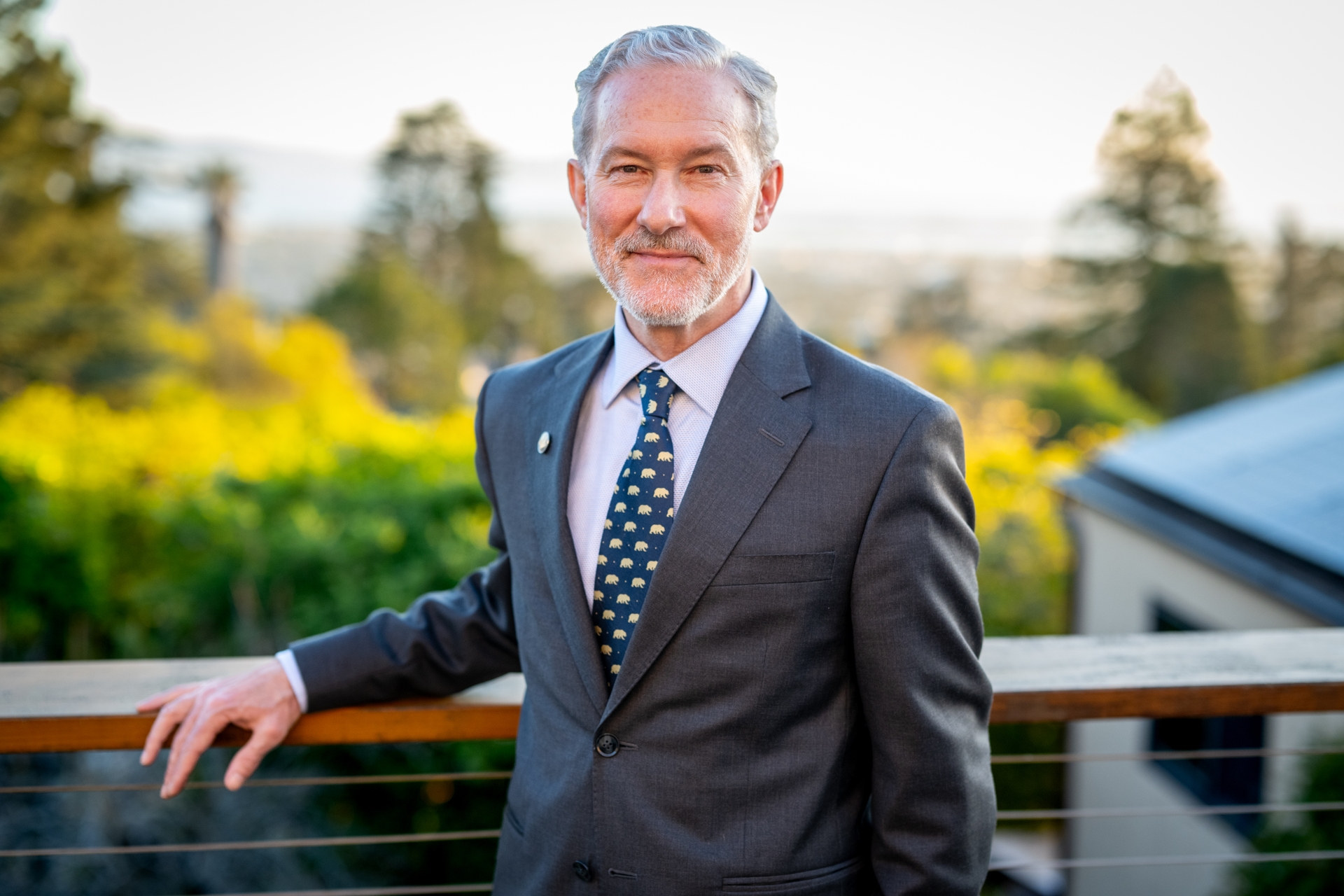
Keegan Houser/UC Berkeley
April 10, 2024
Rich Lyons, an established economist, former dean of the Haas School of Business and the campus’s current leader for innovation and entrepreneurship, will become the next chancellor at the University of California, Berkeley, the UC Board of Regents announced today (Wednesday, April 10).
The board’s unanimous confirmation makes Lyons, 63, the first UC Berkeley undergraduate alumnus since 1930 to become the campus’s top leader. In an interview this week, Lyons said he credits his Berkeley roots and his campus mentors with encouraging him to ask big questions, advance institutional culture and enhance public education — all priorities of his for the years to come.
About Rich Lyons
- About Rich Lyons
- B.S. UC Berkeley 1982 (business and finance)
- Ph.D MIT 1987 (economics)
- Joined Berkeley faculty in 1993
- Dean of Haas School of Business 2008-2018
- Chief innovation and entrepreneurship officer 2020-present
“No institution has come anywhere close to Berkeley in terms of shaping my life,” Lyons said. “There’s this favorite phrase of mine: ‘You can’t be what you can’t see.’ Neither of my parents had a four-year degree when I arrived at Berkeley. For so many reasons, in so many ways, I could have never seen the life I have lived were it not for my undergraduate years at Berkeley.” Lyons, who will be Berkeley’s 12th chancellor, will succeed Chancellor Carol Christ, who announced last year that she’d step down as chancellor on July 1.
“I am both thrilled and reassured by this excellent choice. In so many ways, Rich embodies Berkeley’s very best attributes, and his dedication to the university’s public mission and values could not be stronger,” Christ said. “I am confident he will bring to the office visionary aspirations for Berkeley’s future that are informed by, and deeply respectful of, our past.”
Rising through the Berkeley ranks
Born in 1961, Lyons grew up in Los Altos in the early days of the Silicon Valley start-up boom. But tech companies weren’t exactly a part of his childhood.
His mother had been a flight attendant when she met and later married Lyons’ father, an American Airlines pilot who helped found the airline’s pilots’ union.
Lyons has two older brothers and remembers traveling to the East Bay to attend Cal football games when he was in his early teens. Those trips sparked his lifelong love of Berkeley.
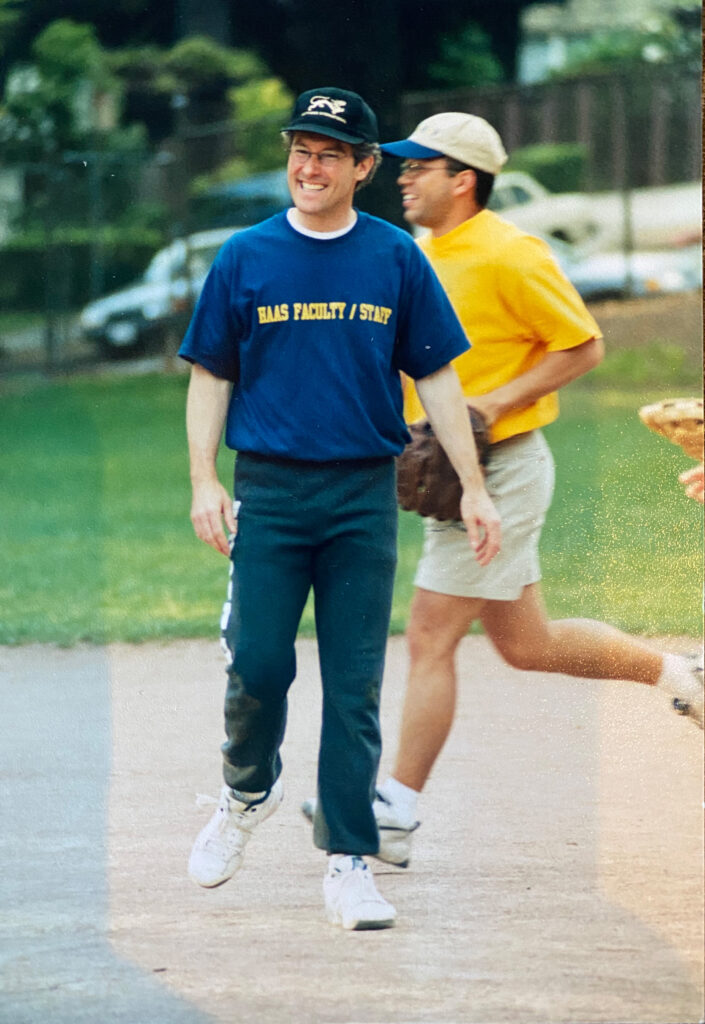
Courtesy of Rich Lyons
He attended Berkeley, where he graduated in 1982 with a Bachelor of Science degree in business and finance. Lyons went on to earn his Ph.D. in 1987 in economics from MIT. After six years teaching at Columbia Business School, Lyons returned west, where in 1993 he joined the Berkeley faculty as a professor of economics and finance, specializing in the study of international finance and global exchange rates.
He’s remained on campus since, with one notable exception.
Starting in 2006, Lyons spent two years working at Goldman Sachs as the chief learning officer. It was a period that instilled in him an appreciation for leadership and the importance of organizational culture.
He carried those lessons with him when he returned to campus in 2008 and became the dean of the Haas School of Business.
While dean, Lyons oversaw the construction of Connie & Kevin Chou Hall, a state-of-the-art academic building that opened in 2017 and is celebrated for its sustainability. He also helped establish two new degree programs, linking the business school with both the College of Engineering and the Department of Molecular and Cell Biology.
But it was his creation of four distinct defining leadership principles that spurred a sweeping culture initiative at the school that stands out in the minds of many. Those values — question the status quo, confidence without attitude, students always, and beyond yourself — became a creed of sorts for new students and alumni alike.
“My goal as a leader then, and now,” Lyons said, “is to facilitate and sustain a culture that supports diversity of perspective, provides every student with a true sense of belonging and encourages educational innovation.”
Those values are important, Lyons said, because they shape and support the cohesive structure of a strong, connected community — spanning science and technology to the arts and humanities. They also convey the story about what it means to be at Berkeley and to believe in the university’s public mission.
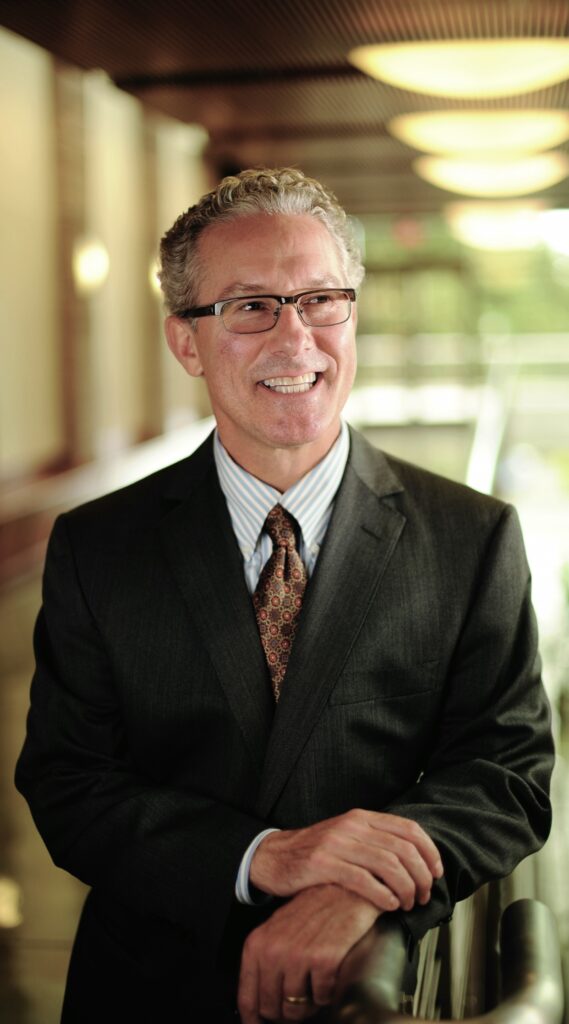
Courtesy of Rich Lyons
“When we are great as educators, it’s identity-making,” Lyons said. “We’re helping students and others see identities in themselves that they couldn’t see.”
At a Berkeley Haas event several years ago, Lyons was asked to create his memoir in six words. Lyons thought about it, trying to trim a life’s lessons into a quick phrase. Finally, he landed on one:
“Lifelong love affair with ideas, learning.”
Lyons said the message still holds true.
“It’s where my best energy comes from,” he said.
Lyons in January 2020 became Berkeley’s first-ever chief officer of innovation and entrepreneurship.
Building on his research exploring how leaders drive innovation and set behavioral norms and culture, Lyons worked to expand and champion Berkeley’s rich portfolio of innovation and entrepreneurship activities for the benefit of students, faculty, staff, startups and external partners.
It was a major commitment to thinking outside the box, he said. One need only look to the Berkeley Changemaker program that he helped launch in 2020 to see innovation and entrepreneurship in action.
The campuswide program with some 30 courses tells the story of what Berkeley is — the story that members of the Berkeley community can tell long into the future. Berkeley Changemaker started as an idea and its courses quickly became among the most popular academic offerings on campus.
“Over 500 students showed up,” he said. “Why? Because it’s a narrative. It’s not just a name. It’s not just a curriculum. It’s not just a course. It’s a way of living, and it’s a way of living that Berkeley has occupied forever. This idea that there’s got to be a better way to do this, question the status quo.”
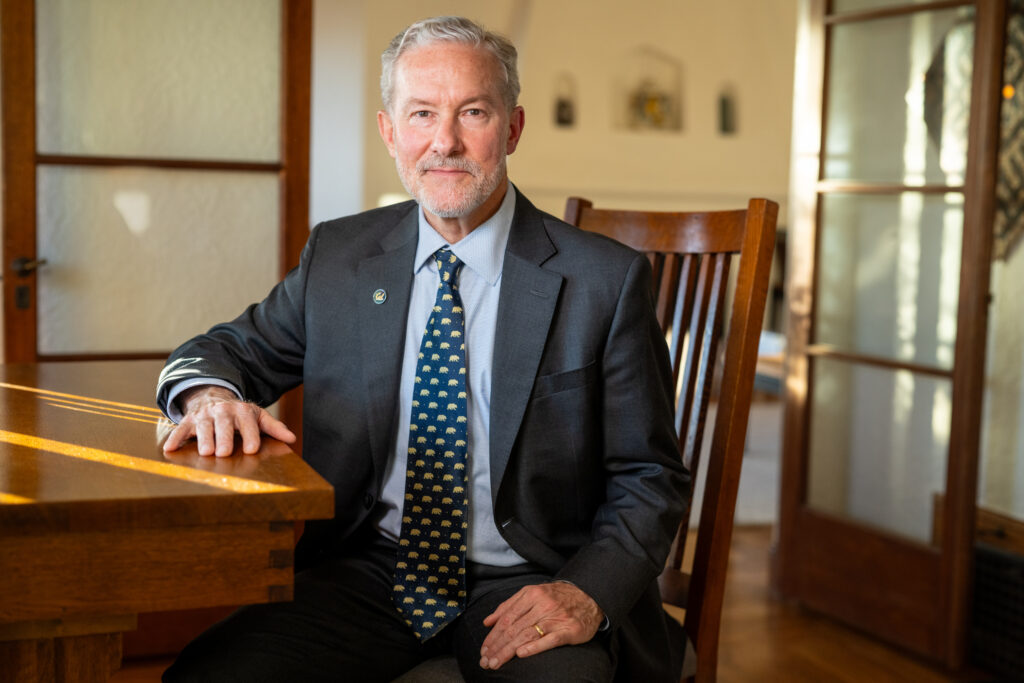
Keegan Houser/UC Berkeley
‘Equity and fairness’ are front and center
Lyons will step into the role of chancellor at a complicated time for higher education. One of the main challenges faced by college campuses is balancing the inherent tension between free speech and maintaining a strong, supportive campus community that accommodates a diversity of perspectives about even the most divisive issues.
Lyons said these challenges are a priority. While he said he has some ideas on how to address those concerns, he added that he will focus on listening in the months ahead.
“A commitment to equity and fairness in society is as fundamental as it gets,” he said. “Every student has a need and a right to feel they belong at Berkeley and that they are respected at Berkeley.”
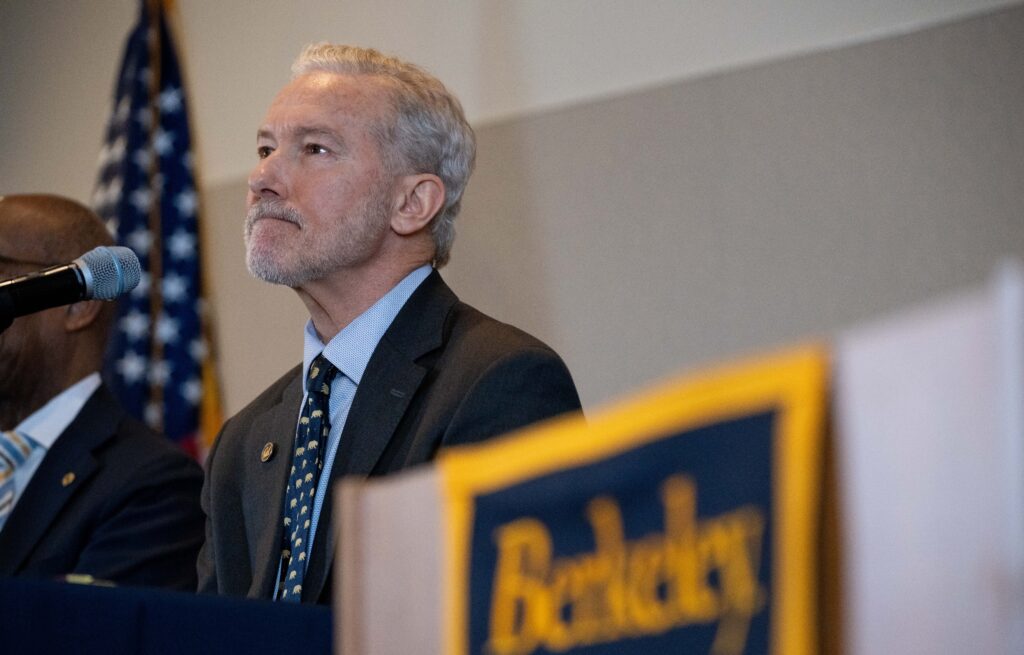
David Esquivel/UCLA
The ability of schools to overcome current challenges hinges on how campus leaders lead, Lyons said. Berkeley is known the world over for its commitment to challenging the status quo and encouraging the changemakers who are advancing the best of the university.
He sees his role — now and as chancellor — as amplifying the stories about what makes Berkeley unique and fostering a culture unmatched by any other university.
“If I’m obsessive about anything,” Lyons said, “I’m obsessive about how leaders work with their people to strengthen culture.”
Maximilian Auffhammer, a professor of international sustainable development who was among five faculty on the search committee, said Lyons is a “fantastic choice to lead UC Berkeley for this next chapter.”
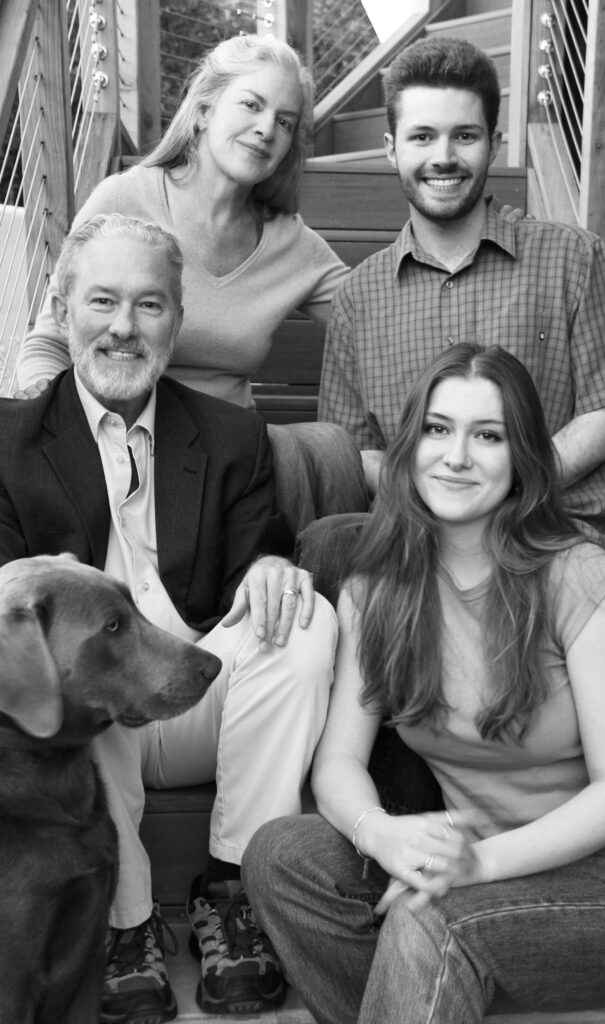
Courtesy of Rich Lyons
“He combines a stellar scholarly record with significant administrative leadership experience at Berkeley and beyond,” said Auffhammer, who also chairs the Academic Senate. “As an alumnus, faculty member and former dean, Rich knows and loves this campus in the same way we all do. I look forward to working together with him to further build out Berkeley’s academic excellence, global reputation and access.”
UC President Michael V. Drake on Wednesday praised Lyons’ ability to work across the campus and the broader community.
“As the world’s preeminent public research university, UC Berkeley needs and deserves a bold and visionary leader with a deep commitment to higher education and to preserving Berkeley’s academic and research prowess. We are thrilled to name Richard Lyons as the campus’s next chancellor,” Drake said. “Rich is a UC Berkeley alumnus and a respected academic leader who brings deep campus and community relationships and a proven track-record of garnering support for impactful programs and initiatives.”
Those community partnerships have been especially important between the campus and the city of Berkeley, where its leadership’s support for the campus’s student housing initiative has been welcome. Of Lyons being chosen as the next chancellor, Berkeley Mayor Jesse Arreguín said he was “delighted with this choice.”
“Whether it’s sharpening the wonderful values that make Berkeley so distinctive or opening new pathways for students to see futures in themselves that they could not see, it adds up to great promise for the university and for campus-city relations,” Arreguín said.
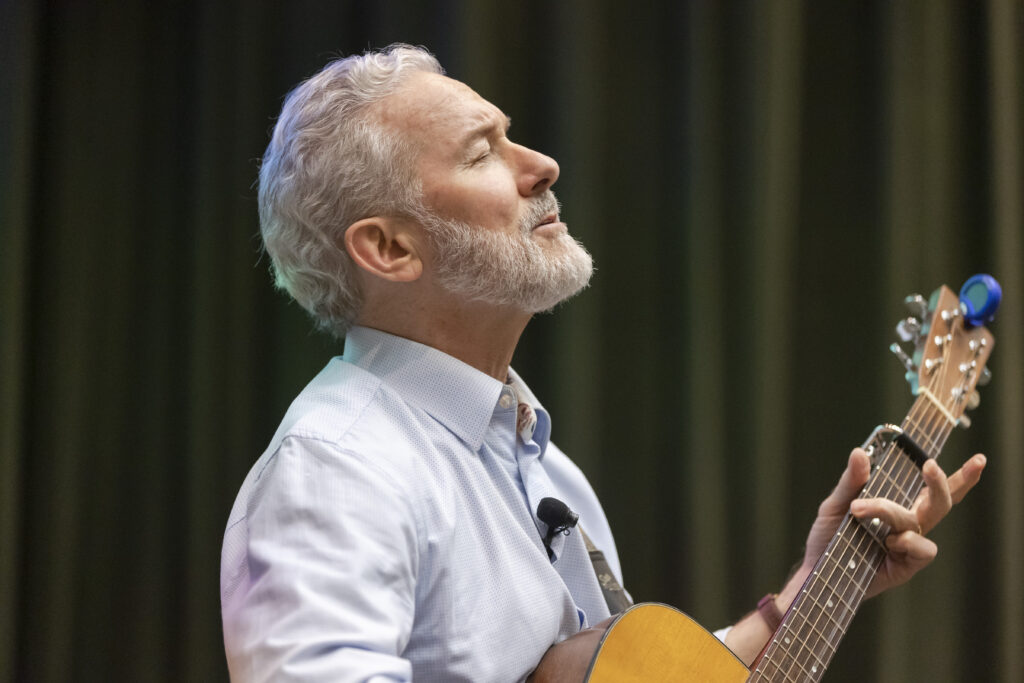
Courtesy of Rich Lyons
Lyons’ days are busy, but he said he always makes time for music. He starts his mornings with at least 15 minutes of playing guitar, a sort of meditation practice that anchors him. He’s been known to strum a few chords and even sing at campus events. A video of his Berkeley-inspired adaptation of the classic Jungle Book tune, “The Bare Necessities,” became a 2017 commencement classic. He played Green Day’s “Good Riddance (Time of Your Life)” in 2018 when he won the Berkeley Citation, among the highest awards the campus gives its community.
Lately, Lyons has been drawn to Bob Dylan’s classic, “Like a Rolling Stone.” It’s a song ostensibly about a person who loses everything and must find a path forward. Lyons has lately been practicing the piece with an alternative interpretation in mind.
“I’m now playing that song as a statement about our time,” he said. “About all of us. Together.”